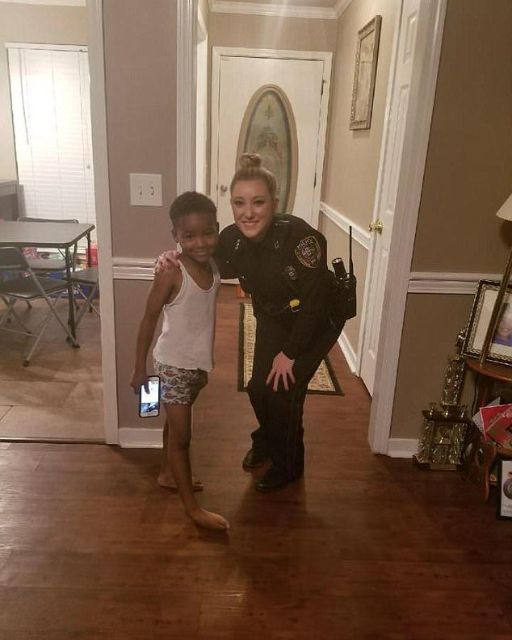Around 9:30 p.m., after tucking in my youngest for the night, the phone rang unexpectedly. It was 911—a silent call from a child, according to dispatch. I followed the location to a modest home in my area. When I knocked, a little boy in pajama shorts, barefoot and clutching a phone like it was his most treasured possession, answered with an anxious yet determined look.
He told me he was hungry and that he hadn’t eaten all day. He explained that he and his younger sister, who slept in the back room, were the only ones home. My heart sank. I asked where their parents were, but he just shrugged, and I noted that the place, though bare, was clean, with empty countertops and a nearly bare refrigerator save for an old jug of milk and a few stray ketchup packets.
Kneeling down, I asked if I could snap a picture with him—just a small memento of this moment. For the first time that evening, he grinned broadly. I quickly called for backup to deliver food, not to make any arrests. I couldn’t leave these kids like that, even if I wasn’t entirely sure what I was stepping into.
The boy, Mateo, was eight years old, and his five-year-old sister, Sofia, was fast asleep. Mateo explained that their mother worked two jobs and sometimes didn’t come home at all—she had left early for her diner shift that morning. Mateo, mature beyond his years, said he always made sure Sofia ate before bed, but tonight, they had run out of everything, even the jar of peanut butter.
Soon enough, an ambulance arrived, and the sirens pierced the calm night. First responders spread the word, and one paramedic on duty—Rosa—arrived with a brown paper bag filled with food. Her warm presence immediately calmed Mateo. “You must be starving,” she said gently as she handed him a foil-wrapped sandwich. Mateo set it carefully aside, then turned toward Sofia’s room. “I ought to wake her up,” he whispered.
“No need,” Rosa reassured him, placing another sandwich beside his. “When she wakes, she can eat.” Mateo’s hesitation was brief; he opened the sandwich and began eating, his face lighting up with relief as if he’d been holding his breath all day. Watching him, I was struck by how easily we take meals for granted when they’re always there.
Rosa and I exchanged a look—a shared understanding that we couldn’t leave these children to fend for themselves tonight. “I’ll stay until social services arrive,” she said calmly. “We need to locate their mother, but let me try reaching her first. If she doesn’t respond, we’ll decide what to do next.” Mateo perked up when he mentioned that his mom worked at Joe’s Diner, though he added that she wasn’t allowed to use her phone at work. Acting on this clue, I radioed a dispatch to check Joe’s Diner. About twenty minutes later, we learned that a woman fitting his description was indeed there, in a state of panic—she had discovered early that she’d left her phone at home and couldn’t contact her children. Her relief upon hearing they were safe was palpable as she pleaded to speak with them.
Social Services was notified when the mother finally returned home. Given the circumstances, they reminded her of local family support options. Rosa even handed her a leaflet with information on community support groups and free meal programs.
That night, as I drove away, I couldn’t shake the image of Mateo, clutching that sandwich—a quiet reminder of how fragile life is for those living from paycheck to paycheck, and how swiftly an act of kindness can change everything.
Two weeks later, who do you think arrived at the station? Rosa. Dressed casually in jeans and a bright yellow sweater, she thanked me for letting her stay that evening and brought a box of baked cookies. “Those youngsters are still on my mind,” she said thoughtfully. “I decided to take action.” It turned out that Rosa had assembled a team of firefighters, nurses, and paramedics to launch a volunteer program called Midnight Meals. Every Friday night, volunteers delivered care packages—filled with toiletries, non-perishable snacks, and handwritten messages of hope—to households identified by local schools as needing extra support. The response was overwhelming: teachers donated books, grocery store owners contributed canned goods, and teenagers volunteered their time. In a matter of months, Midnight Meals grew into a movement far beyond our wildest expectations.
One chilly December evening, Rosa invited me to join her on a delivery route that included Mateo and Sofia’s home. I wondered if they’d remember me or if it would feel intrusive. When we arrived, Mateo greeted us warmly, recognizing Rosa immediately. This time, he wasn’t hungry or barefoot, and standing proudly next to him was their mother. She introduced herself graciously and expressed her heartfelt gratitude for our help that evening and for our continued visits. The house looked renewed inside, adorned with decorations donated by a local church and mismatched ornaments from neighbors. A small artificial tree twinkled in the corner, and Midnight Meals had even provided essential supplies for the kitchen.
As Mateo laughed and proudly showed Rosa his latest school project, I realized that sometimes even the smallest acts of kindness can ripple out to create lasting change. Before leaving, Rosa presented Mateo with a brand-new rucksack filled with school supplies. His eyes welled up with tears as he hugged her tight. “I’m grateful,” he whispered, “for everything.”
On our drive home, Rosa and I reflected on why we chose this work. It can be heartbreaking and challenging, but it’s moments like these—the bright smiles, the quiet gratitude—that remind us why our efforts matter. Every act, whether it’s sharing a meal or just listening, has the power to change someone’s world.
Please share this story if it moved you. Together, small gestures of compassion can create ripples that become waves, transforming lives one act at a time. ❤️
